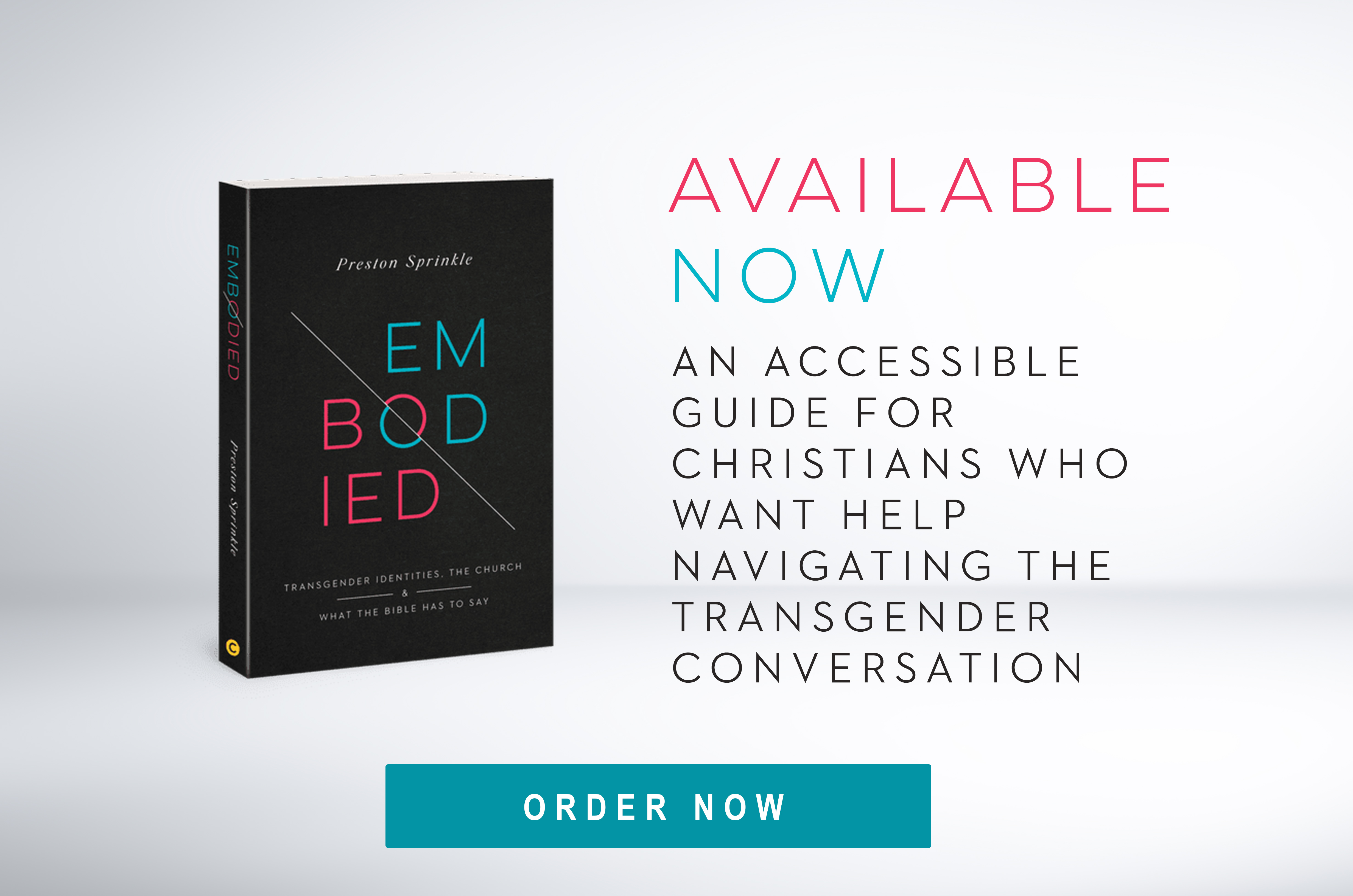
By Gregory Coles. Greg is a Senior Research Fellow at The Center and is the author of Single, Gay, Christian and No Longer Strangers.
“Should I come out to the world as a celibate gay Christian?” I get this question a lot—and to tell you the truth, I’m pretty leery of answering it.
On the one hand, it’s tempting to say an immediate and hearty yes. We have a tendency as human beings to think it’s great when other people become more like us. As far as I can tell, this tendency is the reason married people like to matchmake their single friends so aggressively. It’s the reason college students in the same fraternity or sorority all start to look and dress and act the same. It’s the reason we so often give people life advice that boils down to, “Behave the way I would behave if I were you.”
Buy Now!
Embodied: The Latest from Preston Sprinkle
The truth is, I’m convinced that coming out was the best decision for me, and I don’t regret it in the slightest. I remember what it felt like living in the closet, and there’s no part of me that wishes I still lived there. Being fully transparent about my experience of sexuality has led to deeper relationships, greater ministry opportunities, and more vibrant hope for the future. Why shouldn’t I want others to share this joy with me? The more the merrier!
On the other hand, it would be silly and solipsistic to assume that what has been true for me will be true for everyone. “Coming out” is not an inherently good and helpful experience. On the contrary, coming out can be emotionally taxing and spiritually complicated. On occasion, I’ve seen comings out seem to set in motion a chain reaction that ended with someone’s life or faith in shambles. And even if people’s emotional and spiritual lives remain comparatively unscathed, coming out can still spell the end of jobs, relationships, and family ties.
For me—despite my own gratitude for being open about my experience of sexuality—I confess the data are mixed. Being out has given me less to be angsty about, but also more to be angsty about. It has made my pursuit of Jesus both easier and harder. I am at once more deeply loved and more vehemently disliked by other people. Rest—true, soul-deep rest—comes to me more naturally, and more painfully, than it once did.
So if you’re an LGBTQ+ or same-sex attracted person who loves Jesus, wondering whether it’s worth sharing that story with others, I won’t pretend to answer that question for you in its entirety. Instead, in the fashion of a memoirist-who-prefers-not-to-give-other-people-advice, let me lay out for you two incomplete lists of pros and cons involved in my own coming out: (1) the pros and cons I imagined that never actually happened, and (2) the actual pros and cons I experienced. I’ll also provide commentary (in parentheses and italics, like this) along the way.
Pros I Imagined That Never Happened
- Once I finally came out once and for all, I would never have to come out to anyone ever again. (Turns out, even once you pull off the Band-Aid, you still keep coming out for the rest of your life. Every time you make a new friend, or move to a new place, or catch up with an old friend who missed the Facebook announcement, you’re back to the same old calculations: “Do I need to tell them? Now, or later? Or is it too late at this point?”)
- Anyone who had trouble with me being gay would immediately dismiss themselves from my life, and I’d have the obvious support of the ones who stayed. (Alas, life rarely divides so tidily.)
- I would magically become a better dresser. (Again: alas.)
Cons I Imagined That Never Happened
- Once people knew I was gay, I might never be able to do Christian ministry work again. (In fact, the reverse has been true. I’ve had more fruitful ministry opportunities since coming out than I dared dream of beforehand.)
- Once people knew I was celibate, I might never be able to get a job in the academy. (Sure, a lot of my academic friends think celibacy is kind of weird. But as it turned out, I got multiple offers for professorial jobs when I finished my PhD. I ended up declining them in the end, but that’s a different story.)
- I’d suddenly be faced with the added temptation of having a lot of gay men hitting on me. (Apparently, I am less of a sex magnet than I feared. It seems that, for a lot of gay men, the line “I believe Jesus is calling me to celibacy” is kind of a buzzkill. And the ones who think celibacy is cool and interesting have usually been the ones who want to honor my convictions by not hitting on me. Admittedly, this dynamic may be experienced differently by better-looking people. The Lord has seen fit to facilitate my celibacy by making me look like the kind of guy people want to be friends with, as opposed to the kind of guy people can’t keep their hands off. Small mercies.)
Actual Pros
- I can act like myself without worrying that people will figure out I’m gay. (To be clear, I’m not saying that being gay makes me into a categorically different human who must behave in categorically different ways. But there are definitely things about me—the pitch of my voice, the way I talk with my hands, my great fondness for romantic comedies, the amount I use the word “delightful”—that aren’t exactly stereotypical of straight men.)
- I have so many occasions to talk with people about Jesus. (My sexuality is by no means the most important thing about me, but it’s been the backdrop to a lot of my significant and faith-shaping conversations with Jesus over the years. Coming out means that I finally have the freedom to share those stories with people in their entirety. I get to explain how I’ve experienced God’s grace and presence and intimacy, not just in abstract and theoretical ways, but in the very real trenches of my daily reality.)
- When people tell me they love me, I know that they actually love the real me and not just my straight alter ego. And being known and loved by other people reminds me that I am known and loved by God. (Again, I’m not saying that sexuality is so important to me that people’s love only counts once they know I’m gay. But the reality is, before I came out, people’s love always felt like it came with an asterisk, with a nagging voice in my head asking, “Would they still feel this way if they knew I was attracted to men?”)
- I can take concrete steps, with the help of people in my life, to think about what healthy intimacy and community look like in the context of long-term celibacy. (When I used to tell other evangelicals that I felt God calling me to celibacy, they would reassure me that I would find “the right girl” soon enough—and this reassurance made them feel like they were off the hook helping me imagine a fruitful life of celibacy. Being openly gay changes that equation in beautiful ways.)
- I can play a small role in helping other LGBTQ+ and same-sex attracted people who want to follow Jesus feel less lonely. (When I was young, I felt sure that I was the first person in the history of humankind to experience what I was experiencing. I would have given almost anything to hear someone else say, “My story is like yours, and Jesus is still worth it.” Today, I get to be part of the growing crowd of openly gay celibates, etc., helping people imagine how Jesus might prove himself worth it in their own lives.)
- When I engage in conversations about sexual ethics, I can speak more freely, more honestly, and with greater credibility than I could before. (Last week someone said to me, “You’re a Christian; does that mean you hate gay people?” And I said, “Well, I’m gay, so definitely not. Let me explain…”)
- My presence in Christian communities makes it much more difficult for them to ignore the existence of LGBTQ+ and same-sex attracted people. (Because, you know, I’m standing right there.)
- Women in my life are far less likely to think I’m flirting with them. (I’m not saying it never happens; once in a while, I encounter a woman whose heterosexuality is undaunted by my lack thereof. But for the most part, I find that being openly gay and celibate clears the air.)
Actual Cons
- So many people assume that I’ll eventually end up in a same-sex sexual relationship—and sometimes, they say it so loudly that it’s tempting to wonder if they’re right. (Some more progressively inclined folks hope that I’ll eventually break free from the “bondage” of my convictions and “live my truth.” Meanwhile, plenty of Christian conservatives declare my apostasy and predict that future sexual activity is the inevitable consequence of my self-description as “gay.” I don’t think their arguments are true, necessarily—and yet, as the brouhaha of 21st-century American politics has evidenced, sometimes lies that get repeated again and again start to feel true.)
- Being openly gay and celibate is a spiritually vulnerable posture—and spiritual vulnerability creates increased opportunity for spiritual attack. (If this sounds weirdly charismatic to you, fear not—I won’t ask you to speak in tongues or handle any snakes. But even if you’re as cessationist as John MacArthur, pretty much everybody who takes the Bible seriously can agree that Christ-followers have a spiritual enemy who desires the destruction of our souls. And in my own experience, the tenderness of coming out has made this attack feel more palpable at times.)
- In some evangelical Christian spaces, I’m viewed as a liability, an inconvenience, or an object of suspicion. (Within months after coming out, I had my first experience of being disinvited from a Christian ministry activity when the leaders realized I was gay. “It’s not that WE have a problem with you,” they told me. “But OTHER people might have a problem. We don’t want your involvement to become a distraction to anyone. Best if you’re not involved at all.”)
- I’m no longer close with some people who used to be dear friends. (Most often, these were the same Christians who felt that my choice not to keep aspiring towards heterosexuality, along with my use of the word “gay,” rendered me apostate. I think it was inevitable that we would grow apart… but that doesn’t mean I don’t miss them.)
- Some people expect me to dress fashionably because I am gay. (Per Imagined Pro #3, these people are disappointed.)
In Sum
It bears repeating: Your life and my life are probably not identical. So please, if you’re LGBTQ+ or same-sex attracted, don’t go thinking your experiences will map neatly onto mine, and certainly don’t come out just because I did! As Julie Andrews’s character tells Anne Hathaway’s character in The Princess Diaries 2: Royal Engagement, “Don’t make the same mistakes I made. Make your own mistakes. There’ll be plenty of them.” (Shortly after this, Anne Hathaway’s character ends up kissing Chris Pine’s character. If this isn’t proof that Julie Andrews gives sound life advice, I don’t know what is.)
Why yes, I do enjoy The Princess Diaries 2: Royal Engagement. Why yes, this is suspiciously stereotypically gay of me. See Actual Pro #1.

